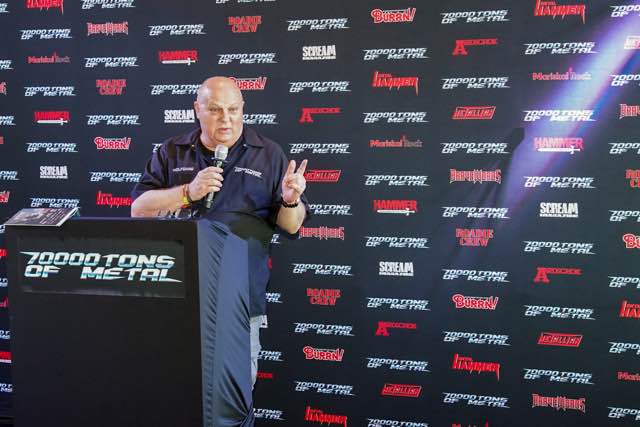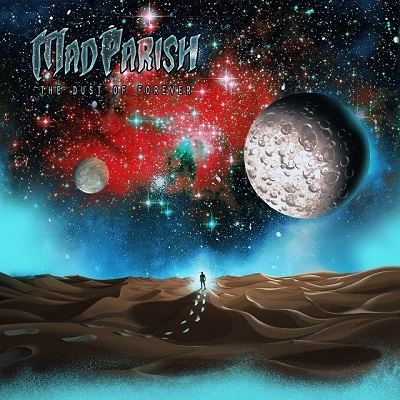From SCORPIONS To SAVATAGE To Sausages! A Conversation With CMM Legend WOLFGANG ROTT
May 4, 2020, 4 years ago
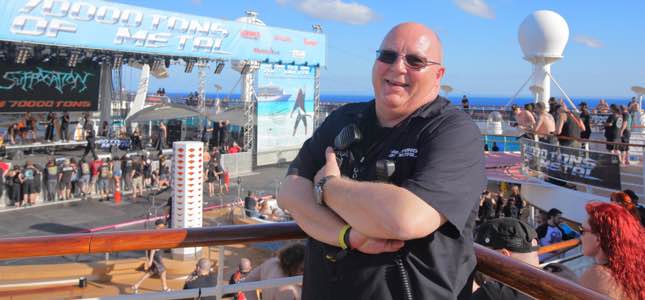
He’s not a mad dog, and most certainly not an Englishman, but CMM Managing Director Wolfgang Rott points at getting the gig as Joe Cocker’s tour manager in 1984 as a “huge step”, breaking into the music business. Prior to that he’d been mimicking early Phil Collins on the drums and organizing the odd blues show. But few people in the industry have been fortunate enough to have such a door open. A lift up as it were. Because I always think about this famous quote by Hunter S. Thompson: "The music business is a cruel and shallow money trench, a long plastic hallway where thieves and pimps run free, and good men die like dogs. There's also a negative side."
Yikes! But Rott refused to rot and his role has flourished, now the Managing Director of his Hannover-based company CMM (Communication Management Marketing) which includes a one-stop shop for every band’s needs via his SAOL (Service For Artist Owned Labels) initiative.
“It wasn’t planned like that, I was lucky at times, it was a roller coaster, but I enjoyed almost every minute,” he begins about his ride of a lifetime working with the likes of Iron Maiden, Black Sabbath, Metallica, Ozzy Osbourne, Judas Priest, Slayer, Scorpions, Savatage, the Trans-Siberian Orchestra and of course helping build 70000 Tons Of Metal.
“Surviving makes you stronger and makes you value all the things you really can do and accomplish,” he adds. “As I said, I was lucky, I met the right people at the right moment. I probably did something right, otherwise you don’t last that long. And what can I say, I had the chance to be involved with a big variety of music. Originally when I was a musician - I played drums and I sang - we played stuff like early Genesis titles, Jethro Tull, Manford Mann type stuff. Then, the first shows I organized were blues stuff, like Eric Burden, John Mayall. I even worked with disco like Eruption, or you might remember One Way Ticket. That was a totally different world. When I got the job to be the tour manager for Joe Cocker in ‘84 that was a huge step, because I’d never done that for such a huge artist. He played big venues, he played the open air stadiums, so you learn a lot and you meet loads of people. So it went, and you get fucked up by some people, so there’s a downside, then you make your way up again and you meet people. David Krebs (Aerosmith manager) and people like that and you get to work with new, big artists. I’d always worked with smaller artists. In the late ’80/early ’90’s, the German band Axxis was a newcomer and we sold over 100,000 of the debut, Kingdom of the Night. Rod Smallwood came into the picture and Bruce Dickinson’s solo stuff, Helloween. It feels strange when you think about it, I’ve been working with Iron Maiden for over 20 years. But it feels like it started yesterday. Then you come up with lots of ideas because you see so many things.”
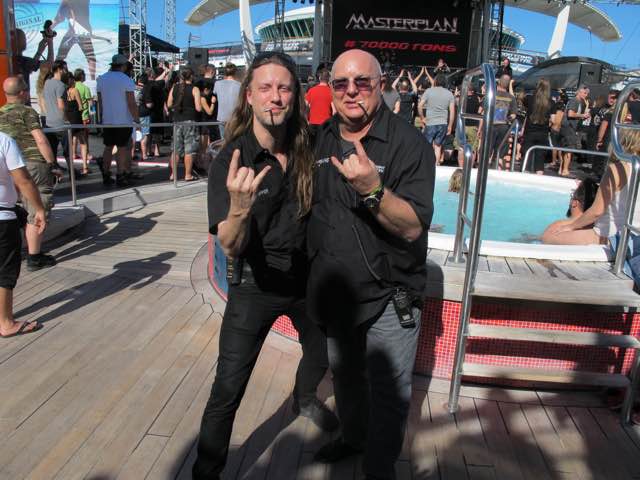
BraveWords: And while the entire planet is currently paralyzed in terms of touring, you built this business model around live shows.
Rott: “I come from the touring business, that’s how I started. There’s a leg of promotion for tours, for albums, so we went into that. When we started the SAOL over 10 years ago, many smaller bands came to us asking us to do promotion. So I created or put together a system with real distribution, digital and physical, and we act like a label but the rights stay with the bands. Bands like Striker and others - bigger bands come to us as well. It looks quite good.”
BraveWords: Considering all the packages you build, SAOL is truly a one-stop shop for any size of band.
Rott: “Plus the fact that besides working for the bands, we work for big events. I worked 10 years for Wacken. Wacken had 15,000 people and many years later when our contract ended, they were up to 50,000. So you learn how to work with this kind of event and max your experience with band promotion and event promotion. Then Andy (Piller; aka The Skipper) came with this crazy idea for 70000 Tons Of Metal, which next year we will have the 11th cruise. I’ve worked on that in total 13 years because we started two years prior to the first cruise. Not to forget it was not always me alone. I always had good people around me which influences your own work, it gives you new ways of seeing things. In the end it’s the team who does it.”
BraveWords: The ones that have excelled in the music business have the respect of their peers, partners and peeps. If you burn a bridge, that scar lasts.
Rott: “And you gotta guide people. I might be the captain, but without the guys firing the machine and doing all the other things, it won’t work.”
BraveWords: One of my mottoes is “always keep the soldiers happy.” Keep them fed, watered, and paid.
Rott: “Yes, and the feeling of belonging to a team. The team spirit is one of the most important things you can have.”
BraveWords: Given your history and expertise, you are a mentor to so many people. Do you every feel like you have a moral responsibility to give back to the scene?
Rott: “Yes, sure. It is and I look forward to that. It was never about the money. It was also never about being a very well-known person, it just happened. I’m at an age where some days you see the retirement flag waving, and I can’t even imagine retiring. Because I have fun doing what I’m doing. Okay, sometimes I’m pissed off and things don’t work, and you just have to shake your head over stupidity or unorganized things from business partners or especially bands. Or you see loads of talent ruin themselves because they don’t want to listen to anything and it feels like you’re walking on a ledge talking to these kinds of people. You’re building a kind of trust and sometimes I know where it comes from - many bands are ripped off and their music came out at the wrong time and didn’t match the spirit of the time, or others tried to run after the trend, and are always behind. There are so many factors. There is no one way. You just have to look at the personalities, you have to look at the possibilities, and you need a great network. I think that’s one of the secrets - the idea of a network where people trust you, you can ask for a favour, and that helps.”
BraveWords: It’s crucial. People ask me about what my job is and it’s not really a job, it’s a passion that tries to pay the bills. So we’re very similar in that sense.
Rott: “Yes. And taking about the bands and the SAOL thing, these days where record companies don’t give you advances anymore, at least up to a certain level, and they make no commitments, sometimes bands have to question themselves; ‘Is this the future?’ I’m not talking about the labels who really build up stuff, because for example when I did Axxis in ‘89-‘90, EMI was totally behind it. They had a three-year plan. Whereas today, maybe they have a plan for two singles.”
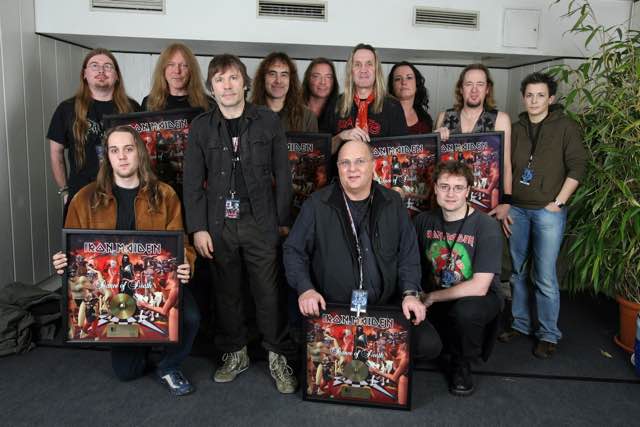
BraveWords: We get flooded daily by so many bands, most of them thinking they can go through the motions, not spending a penny on marketing and rely solely on YouTube videos and social media. Why do people need someone like CMM to represent them?
Rott: “Because we have loads of experience. We saw the things that worked and the things that didn’t. We have the connections and the administration as well, because you can’t run a band with no administration. The smaller successful bands we work with, they divide the work among the band members - so one is taking care of merchandise, one is taking care of records and publishing, another is looking after touring, etc., etc. - that helps a lot and they understand the way business works. It’s not like ‘now I have a record deal so I can lay back and the success will come by itself.’ This is like going to a casino - where your chances may actually be higher. You need somebody that gives you advice. It doesn’t mean we are always right, we give our opinion of how things work, we discuss it, and try to implement a view for the band. Every band is different and they have to believe in themselves, but they also need to listen to what’s going on around them. You know the same as I do that there’s so much information, there have been so many changes, there’s such a huge amount of music that you can’t just put a song on Spotify and that’s it. Things like that happen once in a while, but that’s like a lottery win. You need someone to advise when they have questions like ‘where can I manufacture my CDs?’ Or ‘how many should I manufacture?’ Our big thing is the digital part, and even there you need somebody working with the digital company, to oversee what should they do, and somebody who’s looking at how you can spend your small marketing budget to get the most effect. For example, Jay (Landsford) has 40 years experience at a label. I have experience in almost every single part of the business - I was a tour manager, musician, I was even a technician I did sound and light, and I know the record business, I know the publishers. Then you have people like Sonja (Schlicht) who sees the new way of doing things they are much further ahead in digital and online tools and possibilities available these days, than I am. I know how it works, but not in fine detail. And things change. Print was the main part of the first promotions we did, and we’d have somebody who did a little bit of digital on the side. Now we have three or four people doing digital, and one doing print Europe-wide.”
BraveWords: BW&BK can relate to that. The magazine was funding this thing called a website, that I was persuaded to build in 2000, and then the website was funding the magazine. BW&BK magazine sadly dissolved in 2008, our last issue (#113) had Metallica on the cover.
Rott: “But on the other hand, especially in Europe, you still have to be into magazines to be taken seriously, if you look at the numbers. Everybody can put something online, but the print magazine is a kind of a filter. Also, we’re talking about production. When I was a musician, in the late ’70’s and ’80’s, the filter was studio costs. To go into the studio, the minimum you needed to have was say $30,000 USD or the equivalent of that. Today you need a laptop, a microphone, and a good program. And you don’t even have to play properly because you can correct that. That means you’ve got a flood of music coming out, but the proof always comes out when you’re on stage. That’s one of the reasons normally that I want to see a band live, because that’s when you see their potential. The philosophy on that is the chances to play live for young bands are lower and lower.”
BraveWords: CMM has done a very good job of lifting up smaller bands and finding them the proper tour, or even a treasured spot on 70000 Tons of Metal.
Rott: “That’s the good thing about having a good network, people trust us. I can say if you put this band on tour, we help this tour. That’s good for the main man, the tour promoter, and also for the festival. There are so many aspects to have to look at. We’re comparing to many other independents, and we have like 9-10 people. It’s a burden because you have to feed them all which is sometimes really tough, on the other hand we can split work and get expertise from different angles. And we go to different areas sometimes, like when we did this campaign for the sausage company where we got the bratwurst combined with music for Kissin’ Dynamite last year. In the beginning, everybody thought, ‘what kind of fucked up idea is that?’ And you know what we did? We did the package of the sausage. We met the crazy guys from the meat company, they were on the cruise. And then they said if you buy like five grille bratwurst in a package in a supermarket, there’s one side that gives you all the information about what’s in it, but the other side is not used. So we put a sticker on, we made a landing page, we built a website where you could listen to the songs, and you can win cases of beer and a grill, and a bunch of bratwurst. We ended up in 3,600 supermarkets in Germany. And that means that people with no idea about any of this before, who were just out to buy something to barbecue that evening, they turn over the package and think, ‘What is that?’ So you have this barcode that you key in and all of a sudden you’re listening to the music from a band you haven’t heard before. It doesn’t work like that all the time, but that’s an example about creativity and crazy ideas.”
BraveWords: You’ve got to think outside the freezer!
Rott: “It wouldn’t have happened if we hadn’t met the guys from the butcher factory.”
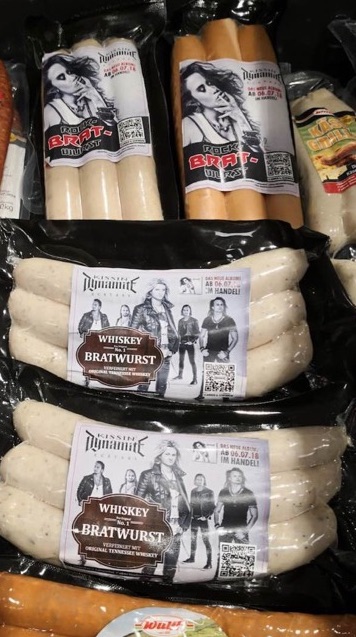
BraveWords: It also helps when the butcher is a fan of the genre of the music you’re trying to sell. Most people who are wearing that suit and tie - or an apron - don’t understand our world.
Rott: “On the other hand you look at people at festivals, or on 70000 Tons, you find all kinds of people. The factory worker, the bank director - the CEO of the supermarket came. You don’t recognize them, you don’t tell them apart because everyone is the same - everyone looks the same, everyone acts the same - but that’s the point how wide rock and metal goes. And that’s what I love about my job. New challenges, coming up with crazy ideas, going into new areas, meeting new people, and having friendships for over 20, 30, 40 years with the people you work with.”
BraveWords: Absolutely. And no barriers, right? Completely open mind. You’re in control.
Rott: “Yeah, I mean sometimes a discussion will change your mind, you’ll say ‘I never thought about it that way’, or maybe you change someone else’s mind. So there’s open discussions. I personally hate dogmas, someone who says this is the only way it is, because it’s never like that. You gotta listen to other people from their point of view, as sometimes you can change their view or they will change yours. That’s life.”
BraveWords: Where do you see CMM headed, especially given the current state of the world?
Rott: “It’s hard to say. Like if you see in the actual moment that a virus all of a sudden is stopping all shows, all activities, all of your normal life, that makes you humble. It makes you think... I can’t explain it, it’s a strange feeling. We had a talk in the afternoon with my guys in the office, and some are scared, but human lives have survived and we’re going to survive it, but it shakes us up and maybe gets us out of our routine. And in this moment, we live in a crazy world. I think we are living in a world that is changed. If you look at the political developments of our countries, and how people were driven by fear, and started isolating themselves. I think one of our jobs will be to break this up. People understand, and coming back to 70000 Tons we have over 75 nations on that boat, and you have people from Syria and Israel, or from other countries that don’t talk to each other, and all of a sudden they are one family. This is what I believe it is all about, and that’s about music. But I never had a general plan. I always had an idea where I wanted to go, but it was never fixed like a road map or something. You always have to adjust things.”
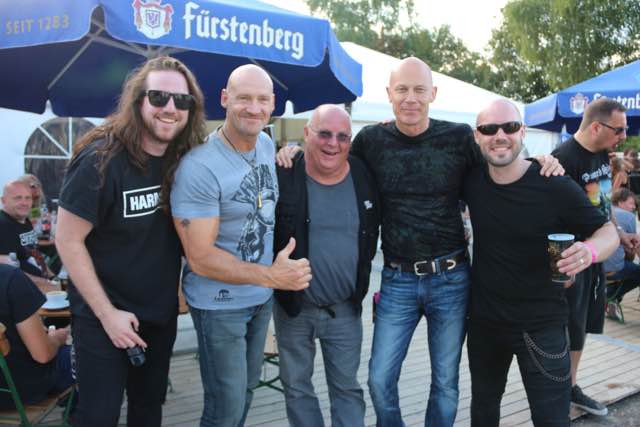
BraveWords: At the end of the day, that’s what makes it a fun ride.
Rott: “We were the first people who did release parties, on the day of an album release, in clubs. It gave people the chance to listen to a full album on the release day. We had release parties where there were 2000 people listening to the new Iron Maiden or whatever. That was an idea and it worked. Another thing is when the live music DVDs started, we did DVD promotion and the DVDs were in the review parts of magazines. And always new things come up. That’s the only hope I have is that we are always on the case of changes. Because the worst thing is you look in your history and all of a sudden you feel that you missed the train.”
BraveWords: We’ve travelled some similar paths and when I reflect on my days at HMV, I think about how hard it is to be an avid collector. Is there anything that you really miss? Anything that really pulls at the heart strings when you look back?
Rott: “We’re in a moment where everything is available, and in the beginning I didn’t have an MP3 player because I didn’t like that, but I got over it and it is much more convenient to have a little case when you’re doing your exercise or otherwise needing music. And now we have Spotify where you can have every song in the world, but you know what I miss? When I was at home, when I was in front of my 2,000 CDs, and I’d look at it and think, ‘wow, I haven’t heard that for a long time’ and you take the CD out, in your hand, you read the booklet, and then you put the CD on and you listen to it and lay back and relax. This is not happening anymore. It’s partly my fault because I don’t do it, or don’t have the time. You can get everything, so the value is decreasing. You can get everything so it’s not worth the same as when you were waiting. You’d go into the shop and you’d find out the new whatever CD or album is coming out soon, and you’d get excited. I just read an article about duties. When I was 18 or 19, we had military duties for men. You had to go, and you didn’t like it, but you did it. You had other duties too, you had to do something for the family, or you had to go somewhere, but it was a duty. Very often you’d start doing it, even though you didn’t want to, but after a time you realize how much satisfaction comes from it. I’m not talking about the military part because I was never in the army, I did civil service. But you’d go out there and meet people and talk. It’s also like meeting friends, sometimes you feel tired and you don’t want to do it, but then you decide to go, and in the end it’s a great evening. But what happens today is there’s no duties, only requests. I want this, I want that, and I want it now.”
BraveWords: Wise words from a wise man.
Rott: “And that makes people unsatisfied, for no reason. Now we’re really getting into philosophical discussions. Technically, you can get most of the things you want. Sometimes you’re limited by money or whatever, but because you can have everything, it’s not special when you get something. Maybe this fucking virus, which is putting us in quarantine, and we have to stay home for two weeks, or we can’t go to a certain restaurant, and we can’t do anything about it - maybe that makes us humble again. We value things more than we thought we did before. We should look for partners who are with you in the boat and not only looking just for money, but want to team up with you to achieve something.”
For more information about CMM and their programs click here.
